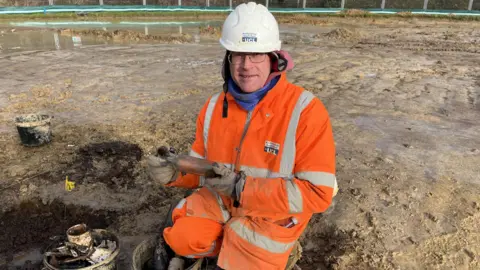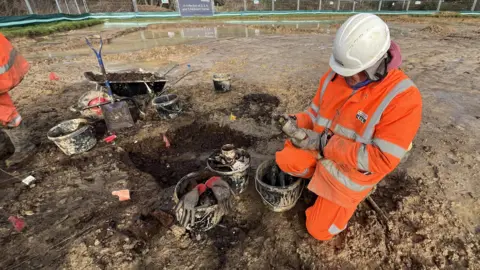Archaeologists study World War One training camp
 George Carden/BBC
George Carden/BBCA team of archaeologists has excavated the site of a World War One training camp in Bexhill.
Cooden Camp was used as a base for troops sent to the front line during the Great War.
Among those trained there were soldiers of the Royal Sussex Regiment, which suffered devastating casualties on the Western Front on 30 June 1916 – known locally as "The Day Sussex Died".
Housing developer Bellway, who commissioned the dig, has planning permission to build 70 homes near Clavering Walk.
The housebuilder has teamed up with Archaeology South-East - part of the UCL Institute of Archaeology - and the county archaeologist at East Sussex County Council on the project.
Simon Stephens, project officer with Archaeology South-East, said they found plates, bowls, bottles, boots and fired rounds.
He added: "They were just Sussex lads, I'm Sussex born and bred, they were just lads who talked like me.
"[They] ended up being trained here and then they did the typical pals thing, they joined up together, they trained together, and a lot of them died together."
 George Carden/BBC
George Carden/BBCOpened in 1914, Cooden Camp was used throughout World War One, originally housing men who would form the 11th, 12th and 13th Battalions of the Royal Sussex Regiment.
The Sussex men who trained at the camp were involved in The Battle of the Boar's Head.
The camp was subsequently used as the temporary home of men in training from as far afield as South Africa and Australia, later becoming the site of a Princess Patricia's Canadian Red Cross Hospital in 1918, before closing the following year.
The excavation is taking place on the northern part of the site and is due to finish by December 2025.
There was some opposition to the site when the plans were announced.
Follow BBC Sussex on Facebook, on X, and on Instagram. Send your story ideas to [email protected] or WhatsApp us on 08081 002250.
